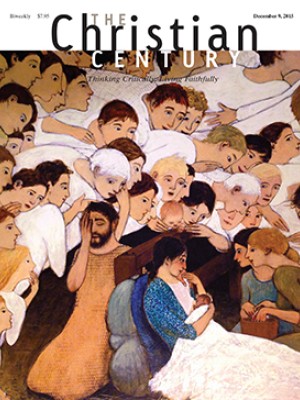Knee-deep in renewal

A few months ago, Derrick Weston, assistant program manager of the 29th Street Community Center in Baltimore, led a group of high school students to an abandoned park in Harwood, a predominantly African-American neighborhood, where they picked up trash, repaired fences, and converted bookcases into raised gardening beds. They built up soil, dug holes, and carefully planted impatiens and coleus.
Some days the kids became frustrated, because the broken bottles, syringes, and wrappers that they had picked up seemed to reappear. They felt that their work was being disrespected. But they persisted.
“Planting flowers goes against a culture of death and violence. It pushes back against the corrosive effects of much of everyday life,” Weston wrote on his blog. The team pursued beauty in the midst of neglect. Weston became aware of God’s kingdom there on that small patch of land. “Because the kingdom of God is like yeast or a mustard seed or some other small thing that has rippling effects, perhaps our small actions will surprise us with exponential goodness.”
Read our latest issue or browse back issues.
As the months passed, the students saw the goodness grow exponentially. The flowers bloomed, and people donated plants and pitched in to help water them. A steady stream of people told the students they were glad that the park hadn’t remained abandoned.
As for the students, Weston said, “They began to think about how they could improve the quality of the neighborhood where they live. They took more pride in it.” And “there was less trash,” Weston said, “because [the area] was being maintained.”
I live knee-deep in the work of church renewal and planting—studying church developments, bridging denominational structures, coaching individual pastors, and serving on the leadership team of a new worshiping community. Anyone who pays attention to what’s happening can see the rippling effects of God’s kingdom in buildings, movements, and practices. I couldn’t quite comprehend it all before picking up Diana Butler Bass’s Grounded: Finding God in the World—A Spiritual Revolution.
Bass explains that the church has previously been working with vertical structures: God resided in heaven, humans dwelled on earth, and the church provided a pathway to God. A chasm existed between the creation and the Creator that the church had to mediate. Now people are awakened to God in and among creation. “It’s a return to the soil,” she said.
Buildings were constructed like giant arrows pointing to the heavens. Looming spires, crow’s nest pulpits, and glorious archways directed people’s attention to eternal glories. Now one of our greatest challenges is to figure out how to be faithful stewards of those structures, which we struggle to maintain. People do not enter buildings to connect with God in the same way they did in the past.
Some theologies have also been built to point to the heavens and seem to ignore the struggles of this world. The ways in which we structured ourselves as worshiping people could close us off from our neighborhoods and the earth. Now theological inspirations come from “Black Lives Matter” and Moral Mondays, movements that demand a focus on the earthly present.
In all of these changes, Bass wants to bring us back to earth. “The church is not on top. The church is part of the social and spiritual architecture,” she writes. “We need to reposition the church in that architecture, within the land of the sacred, instead of saying that only the church is sacred.”
Bass lifts up theologies that support the ground of all being and celebrates panentheism. She points to new worshiping communities, like the Garden Church in San Pedro, that are taking root, restoring barren land, and feeding neighborhoods.
The ripples continue at Princeton Theological Seminary, which has begun a “Farminary,” a working farm that shapes leaders of the church through labor and table fellowship. Students study Hebrew texts from agrarian settings and talk about food justice, sustainability, environment, and climate. The ripples continue at churches that host farmer’s markets in parking lots, gathering communities of farmers and crafters to support local economies and sustainable practices, and at churches that have ripped up their lawns and planted community gardens.
Of course, this news can be difficult for church leaders who have been devoted to building structures. The question arises, “Can we let go of these things that keep us from the larger work of God?”
Bass unflinchingly faces the realities of environmental destruction. I asked Bass if there could be a connection between the apocalyptic visions that come up in Advent and the environmental destruction that looms around us.
“There is a way in which the world is apocalyptic,” Bass explained. “Apocalypse is here, just as the kingdom of God is here. Those are equal realities.”
Derrick Weston echoed the joy of the rippling kingdom as he talked about his team of high school students. “We’ve become accidental conspirators with God in continuing acts of creation.”






